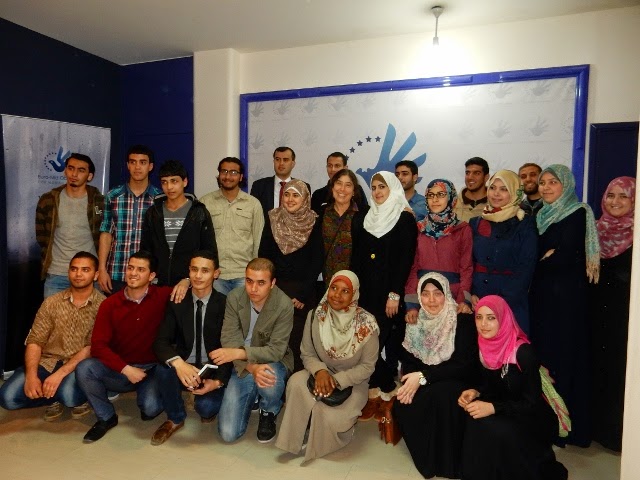Because Gaza is so isolated with the long standing blockade and constricting siege, visitors are often asked to multitask as sherpas, bringing suitcases filled with needed medicines, children’s books, toys, gifts from relatives living in the US (connected by SKYPE but without the human opportunity for physical contact), chocolate in utterly inadequate quantities, and other assorted gifts as acts of solidarity and support.
So I find myself stuffing 20 copies of Gaza Writes Back into my bulging suitcase and an envelope from the publisher, Just World Books, to the editor of this remarkable collection of short stories by young Gazans who write about their experiences during Operation Cast Lead. Refaat Alareer joins me the first night in the Marna House restaurant, a lovely place to meet, talk, and inhale the sweet perfumes of hooka.
I am well rewarded for my efforts. He refers me to Maisam Abumorr, the Gaza coordinator of We Are Not Numbers, a project established by a US freelance writer, Pam Bailey, to develop young Gazans who aspire to be writers in English. Maisam invites me to a discussion with a group of college students at the WANN office which is provided by an NGO, Euro-Mid Observor of Human Rights. I learn that this NGO has just published a report on the use of Palestinian civilians as human shields by Israelis during the 2014 invasion entitled Israeli Matrix of Control.
Maison emails me “a few topics that you might want to discuss with our group” and I am totally intrigued at the level of sophistication and their interest in my Jewish and medical background. (How are your stereotypes about Gaza doing?)
1) In the preface of your book, Broken Promises, you acknowledge how hard it is to reach beyond “the choir” when writing about Palestine. What advice would you give us, Palestinians in Gaza, about how to best tell our stories so that people beyond the sympathetic activist community will read and absorb?
2) What kind of messages and stories were most effective in opening your own eyes, as a Jew, to the perspective of the “other”? We’d love to hear some examples.
3) You are trained as a physician. When, how and why did you become a writer as well?
4) You also are a filmmaker. Many people think video is much more powerful than the written word. How you view the advantages of both, and the continuing role of written stories?
5) Now that you are in Gaza, after the war, what do you think are the most common myths about Gaza that we need to help dispel through our stories?
The room is crowded with over 30 students, men and women, and I decide I will just launch into my personal journey, invite questions and see what happens. The hour and a half is an extraordinary sharing of information, attitudes, and controversies that range from how to write well, what is inspiration and how to hone your craft, to issues of publishing, social media, and websites. We debate the history of the region, the use of language to shape ideas, the role of writers in society; the students are thoughtful, passionate, and eager. The most interesting moment for me comes when we discuss what does it mean to resist oppression, how to honor the right of all oppressed peoples to resist, is violent resistance ever effective, what is the cost, and how the voices of powerful writers are important components to a resistance movement. We ended with the potent understanding that in the age of the internet and social media, writing is a formidable method of not only informing the international community and changing the political conversation, but also actually breaking the siege of Gaza.

The good news is that this program is looking for writers to mentor students and review their work and I leaped at the opportunity to join the mentorship program and perhaps contribute in some small way to the personal growth of a young Gazan writer and to the political challenges that we face now together.

